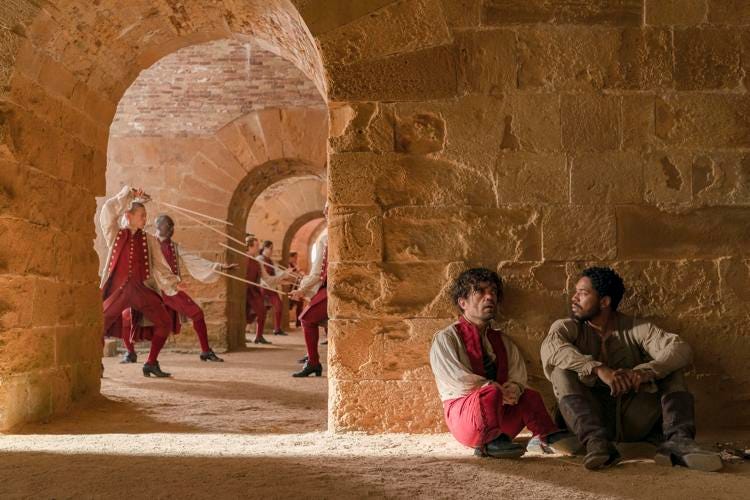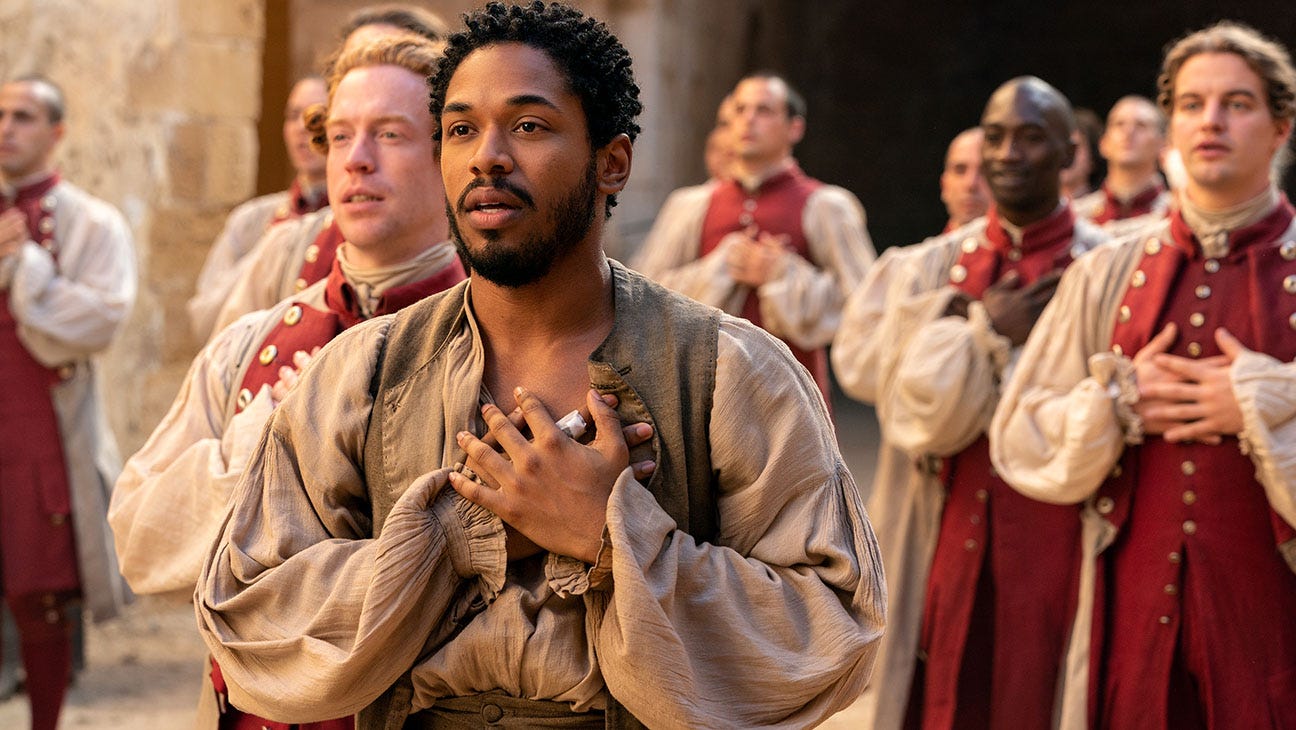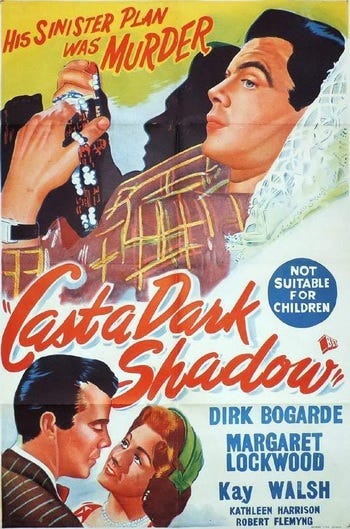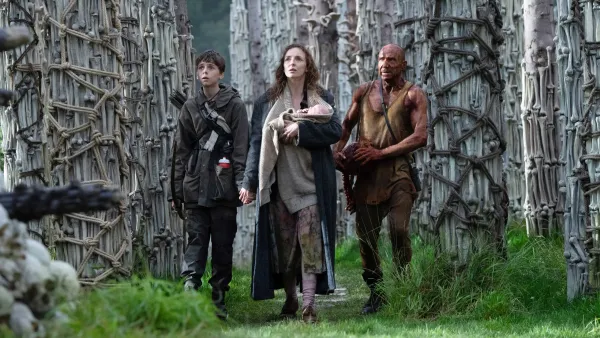"Cyrano": No Nose is Good Nose
The romantic warhorse gets a musical makeover, courtesy of Joe Wright, Peter Dinklage, and The National.

The Nut Graf1: Peter Dinklage confirms his leading man status as the master of Parisian panache in Joe Wright’s hyper-romantic “Cyrano” (in theaters, **1/2 stars out of ****), but the music and lyrics are an exercise in derring-don’t.

If you’re looking for an excuse to head back to the movie theaters and escape the horridness of the real world this weekend, I guess “Cyrano” will serve your needs. It’s big and it’s colorful and it feels like there are extras spilling over from every scene: twelve bakers dancing, eleven waifs a-waltzing, 100 soldiers prancing along a battlement in Busby Berkley overhead formation. Director Joe Wright is behind this movie adaptation of the stage musical adaptation of the hardy 1897 Edmond Rostand play “Cyrano de Bergerac,” and he likes to do things big. Sometimes the big things are good: 2005’s “Pride and Prejudice,” for instance, or “Atonement” (2007), or the Winston Churchill drama “Darkest Hour” (2017). Sometimes they’re just big: “Anna Karenina” (2012), “Pan” (2015). Occasionally they’re awful: last year’s “The Woman in the Window.” “Cyrano” is a rebound but an uneven one, owing much of its strength to its star, Peter Dinklage.
I’d say it’s about time Dinklage held down the lead role of a movie, but he already has. “The Station Agent” (2003) was an art house hit that broke the actor loose from bit parts and day jobs, and there was a 2017 sci-fi thriller, “Rememory,” that went nowhere. It was over eight seasons of HBO’s “Game of Thrones,” of course, that Dinklage became a household name, and you could argue that as the much-loved face of a series with so many outsized characters and performances he demonstrated the proper charisma we look for in a star. But some of us had had an eye on the guy from his very first film appearance, as an actor going nuclear about the dwarf cliches of pretentious art films in 1995’s “Living in Oblivion.” It is a wonderful scene and I offer it for your delectation here:
As Cyrano de Bergerac (who was an actual historical figure, I’m always startled to remember), Dinklage forgoes the prosthetic nose; the character’s physical otherness is his size, which is obliquely mentioned only once and even then warned off by Cyrano growling, “Careful…” The actor handles the derring-do – the swordsmanship, the badinage, the lovelorn soliloquies – with panache, a word that itself derives its modern meaning from the Rostand play. And by way of the actor’s physiognomy and established persona, Dinklage’s Cyrano is imbued with a mournfulness that sits like a royal mantle on his shoulders – a grief that feels both existential and earned. (By contrast, the Cyrano played recently by James McAvoy, if you were lucky enough to have seen it on stage or via National Theatre Live, was hot with cynical rage.) (And if you weren’t able to see it, it’s coming to the Brooklyn Academy of Music in April.)

Haley Bennett makes Roxane into a headstrong Pre-Raphaelite beauty, and Kelvin Harrison Jr. is a stalwart Christian; Ben Mendelsohn, always a reliable snake in the grass, is the villainous Duc de Guiche, and Bashir Salahuddin turns the hero’s-best-friend role of Le Bret into something grounded and meaningful. The cinematography by Seamus McGarvey relies (or seems to) on natural sources of sun and candlelight, giving an intimacy to even the most jostling crowd scenes. The visuals are rapturous, up to the very edge of kitsch but not quite over it. What’s not to like?
Oh, dear. I suppose it’s the songs.
You can be a fan of The National, the long-lived Cleveland, Ohio, rock band – I certainly am – and still take issue with the score for “Cyrano.” The music and lyrics were written by the group’s twin brothers, Aaron and Bryce Dessner, for the 2018 stage “Cyrano,” directed by Dinklage’s wife, Erica Schmidt, from which this film was adapted. The Dessners are gifted and ambitious, and they’ve worked on projects that span the gamut of pop culture from Philip Glass to Taylor Swift. On their records as The National, with vocalist Matt Berninger singing the lyrics in an appealingly depressive baritone, they build glorious sonic cathedrals of melancholy. But there’s a sameness to the Dessners’ output that works as music and mood without having the variety necessary for narrative drama.

In short, the songs here all sound the same. From Roxane’s plea for love, “Someone to Say,” to Cyrano’s plea to love, “Madly,” to the final duet, “No, Cyrano,” it’s all one lovely, mid-tempo, undifferentiated moo. (Except for Mendelsohn’s big number, “What I Deserve,” in which this talented character actor unveils a croak to rival Pierce Brosnan’s vocal stylings in “Mamma Mia!”). Ironically (or not), the soundtrack works far better as a standalone listen on Spotify or Apple Music than in the film, where one’s attention is drawn to the banality of the lyrics (“I need someone to die for/write poems and cry for”) and to the way the songs don’t augment the movie so much as stop it dead in its tracks. The orchestrations by the London Contemporary Orchestra are gorgeous, and if “Cyrano” catches you in the right frame of mind, you may be happily sobbing by the end. But you won’t come out humming the tunes, because, honestly, there are none. You probably will come out wanting to see Peter Dinklage take the lead in more movies, though, and I hope someone in Hollywood hears you.

DVR Alert: Turner Classic Movies is showing the undeservedly obscure “Cast a Dark Shadow” (1955) on Sunday at midnight and again at 10 a.m. Directed by Lewis Gilbert, it’s an eerie little noir about a charming man, played by the charming Dirk Bogarde, who marries wealthy women and kills them. Bogarde is delightfully menacing with the slightest tinge of camp, and Jack Asher’s razor-sharp B&W cinematography takes the title to town. A four-star classic? Maybe not. But good, ghoulish fun, and, like the poster says, “not suitable for children.”
If you enjoyed this edition of Ty Burr’s Watch List, please feel free to share it with friends.
If you’re not a paying subscriber and would like to sign up for additional postings and to join the discussions, here’s how:
If you’re already a paying subscriber, I thank you for your generous support.





